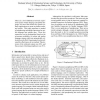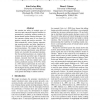NAACL
13 years 11 months ago
2004
Definition questions represent a largely unexplored area of question answering--they are different from factoid questions in that the goal is to return as many relevant "nugg...
NAACL
13 years 11 months ago
2004
The regular occurrence of disfluencies is a distinguishing characteristic of spontaneous speech. Detecting and removing such disfluencies can substantially improve the usefulness ...
NAACL
13 years 11 months ago
2004
There are a lot of differences between expressions used in written language and spoken language. It is one of the reasons why speech synthesis applications are prone to produce un...
NAACL
13 years 11 months ago
2004
We examine the utility of multiple types of turn-level and contextual linguistic features for automatically predicting student emotions in human-human spoken tutoring dialogues. W...
NAACL
13 years 11 months ago
2004
We demonstrate a new research approach to the problem of predicting the reading difficulty of a text passage, by recasting readability in terms of statistical language modeling. W...
|
Computational Linguistics


